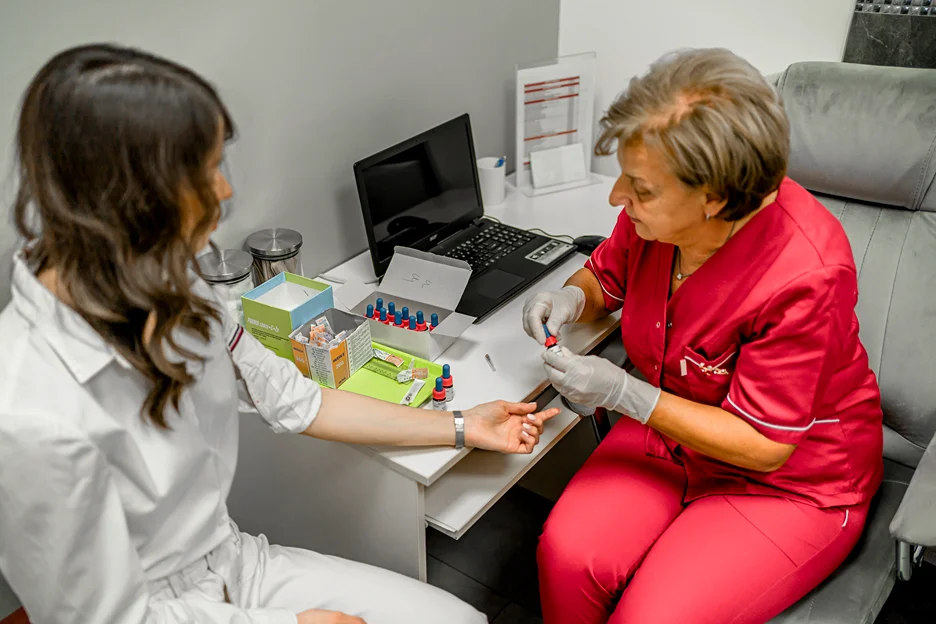How Allergies Can Lead to an Aching Neck
The spring season is welcomed by many as a time of renewal and fresh opportunities. However, for those suffering from allergies, spring can be met with dread instead of delight.
Itchy eyes, runny nose, and constant sneezing can make allergies an unpleasant nuisance. But did you know that allergies can also cause neck pain?
Allergies affect over 50 million Americans each year. The pollen floating in the air causes an allergic reaction that can lead to a variety of symptoms.
One overlooked effect is neck pain. Keep reading to understand the connection between allergies and neck aches, along with some simple treatments to find relief.
What are Allergies and What Causes Them?

An allergy occurs when the immune system overreacts to a typically harmless substance called “allergen”. When a person with allergies is exposed to an allergen for the first time, the immune system treats it as an invader.
It produces antibodies called immunoglobulin E (IgE) that identify and try to destroy the allergen. Once these IgE antibodies are created, they remain in the body.
The next time that allergen enters the body, the IgE antibodies identify it and trigger the release of chemicals like histamine. This causes inflammation and the common allergy symptoms we experience.
Allergies tend to run in families and are more common in those with other conditions like asthma or eczema. Common allergy triggers include:
| Allergen | Description |
| Pollen | Trees, grass, and weeds release these tiny particles into the air to fertilize other plants. For those sensitive to pollen, it causes hay fever or allergic rhinitis. |
| Dust Mites | These microscopic insects live in bedding, carpets, and upholstered furniture. Their feces and remains can build up in houses and cause perennial allergic reactions. |
| Mold | Exposure to mold spores from damp areas like bathrooms or basements can lead to nasal congestion, coughing, and irritation. |
| Animal Dander | Pet hair, skin flakes, saliva and urine contain proteins that can trigger allergies in those sensitive to them. |
| Food | Any food can cause an allergic reaction, but the most common food allergens are milk, eggs, peanuts, tree nuts, soy, wheat, fish, and shellfish. |
Can Allergies Cause Neck Pain?

Believe it or not, seasonal and environmental allergies can contribute to neck aches and pain. Here are some of the main ways allergies and neck pain are connected:
Allergy Symptoms Cause Muscle Tension
Constant sneezing, coughing, clearing your throat, and trouble sleeping due to congestion can all cause strain on the muscles in your neck area. Think about how often you need to throw your head back to sneeze during allergy season. This repetitive motion can lead to muscle tightness and spasms.
The lymph nodes around your neck can also become swollen due to your body’s allergic response. This swelling and inflammation puts uncomfortable pressure on the muscles surrounding the lymph nodes. Overall, the repetitive motions and lack of quality sleep from allergy woes can create muscle tension that radiates into neck soreness.
Severe Allergies Cause Referred Pain
Some people suffer from severe allergies that may cause other related symptoms like chronic sinus infections or frequent headaches. The congestion and pressure from severe allergies can radiate into dull aches and pain in the neck area.
While not arising directly from the structures in the neck, this radiating and referred pain is perceived as coming from the neck muscles and soft tissues. Treating the root allergy problems helps minimize this type of secondary neck pain.
Tense Muscles Cause Secondary Pain
Once neck muscles become tense and irritated due to allergies, this muscle tension itself can lead to myofascial pain syndrome. Myofascial pain is caused by trigger points or knots that form in the connective tissue and fascia surrounding muscles.
The tensed neck muscles from allergies cause Areas of stiffness form and can radiate pain signals to nearby regions. This creates a cyclical effect where the initial muscle tension from allergies leads to more localized neck muscle pain. Relieving the contracted muscles helps break this pain cycle.
No matter the exact cause, the end result is often stiffness, spasms, and pain in the delicate tissues of the neck region. Finding the right treatments and techniques to ease this type of neck pain can greatly improve comfort and function.
Allergy-Induced Neck Pain Shouldn’t Be Endured – Kaly Gets You The Best Specialist With The Expertise To Solve Your Problem
Symptoms of Neck Pain From Allergies
If you suspect your neck ache is associated with allergies, be on the lookout for these common symptoms:
- Aching or soreness in the neck muscles
- Stiffness and reduced range of motion when turning the head
- Sharp or radiating pain when moving the neck
- General muscle tightness causing difficulty swallowing
- Headaches in the back of the head traveling down the neck
- Pain or numbness radiating down one arm
- Burning sensations in the shoulder and neck region
- Lymph nodes in the neck feeling swollen and tender
- Insomnia or frequently waking up due to congestion and neck tension
Pay attention to when the neck pain occurs in relation to allergy flare-ups for clues about this connection. Keeping a symptom journal can help you identify patterns.
Treatments for Neck Pain Due to Allergies

The good news is there are many conservative treatment options to try for relieving neck pain associated with allergies. Reducing allergy symptoms and addressing any related muscle tension is key.
Over-the-Counter Oral Medications
Antihistamines block the histamine chemical responsible for many allergy symptoms. By reducing sneezing, itching, and congestion, antihistamines can minimize repetitive strain on neck muscles.
Oral decongestants and allergy medication combinations that include a decongestant can further help relieve sinus pressure contributing to neck pain.
Non-steroidal anti-inflammatory drugs (NSAIDs) like ibuprofen (Advil, Motrin) or naproxen can ease neck pain and inflammation directly. Acetaminophen (Tylenol) is another option for relieving general aches and pains associated with allergies.
Allergy Medications
Besides oral antihistamines, specialized allergy medications like nasal sprays and eye drops can provide targeted relief for symptoms like congestion and itchy eyes that indirectly irritate neck muscles.
Allergy shots or sublingual immunotherapy involves placing a small amount of the allergen under the tongue to gradually desensitize your immune system over months or years. Though more time intensive, this treatment can significantly reduce long-term allergy symptoms.
Hot and Cold Therapy
Applying something warm like a heating pad or warm wet towel can stimulate blood flow and relax tense neck muscles. Use a cold pack wrapped in a thin towel to numb acute pain and reduce inflammation. Alternating heat and ice is ideal.
A randomized controlled trial has shown that 50-60% of patients in both groups reported their pain was better or much better after the heat and cold therapy, where 75-80% also said they would use the same therapy again in the future.
Massage
Massaging the neck stimulates circulation while kneading and stretching tight neck muscles. Use gentle strokes and avoid directly massaging swollen glands.
Seeing a massage therapist trained in neuromuscular therapy or trigger point release may provide the most targeted pain relief. Self-massage wands are also available.
Posture and Ergonomic Modifications
Pay attention to head and neck positioning when working or sleeping. Use contoured pillows and lumbar supports to alleviate pressure on the neck. Avoid hunching over devices or cradling your phone between your shoulder and ear. Modifying posture and desk setup helps minimize daily neck strain.
According to a 2023 review, ergonomic training and therapeutic exercises help reduce neck pain and disability and improve neck posture.
Stress Management
Allergies combined with neck pain are physically and emotionally taxing. Practicing relaxation techniques like deep breathing, meditation, yoga, or Tai Chi can help control your stress response. This assists in lowering muscle tension and pain sensitivity. Getting adequate rest is also key.
Targeted Exercises and Stretches
Gentle range of motion exercises that stretch and strengthen the neck can ease muscle tightness. Specific exercises will depend on your needs. A physical therapist can prescribe a customized exercise regimen to address your particular neck pain pattern.
Unsure How To Treat Your Allergy-Related Neck Pain? Let Kaly Match You With Top Experts To Evaluate Your Options
Home Remedies for Neck Pain With Allergies
In addition to medical treatments, several simple at-home measures may help relieve neck ache associated with allergies:
- Take a warm shower or use a heating pad on the sore neck muscles for temporary relief.
- Improve air circulation and filtration in your home to reduce allergens. Change air filters regularly.
- Consider covering mattresses and pillows with allergen-blocking covers to minimize exposure to dust mites.
- Use a humidifier or vaporizer to add moisture to the air, especially in dry, overheated homes during allergy season.
- Alter your sleep position using a special orthopedic pillow to support the head and neck. Sleeping on your back is ideal.
- Drink plenty of water to avoid dehydration which can worsen neck tension.
- Gently stretch the neck throughout the day and try to maintain good posture when sitting at a desk or computer.
- Apply topical creams containing menthol or capsaicin to numb and relax neck muscles.
- Try adding magnesium and B complex vitamins. Deficiencies may increase neck muscle spasms.
- Avoid excessive caffeine as it can exacerbate tension.
- Use essential oils like lavender, peppermint, or eucalyptus. Their anti-inflammatory properties may help relieve muscle aches when applied diluted to the skin.
Since allergies can be unpredictable, be prepared to try a combination of medical and at-home treatments for optimal relief of allergy-related neck pain.
Takeway

Neck pain and allergies may seem like unrelated problems. But in reality, chronic allergy symptoms can put a strain on the neck muscles and aggravate delicate structures in the region. Treating the root allergies as well as the resulting muscle tension is key to soothing allergy-related neck aches.
If you are struggling with ongoing neck pain and allergies, consider contacting the allergy and chiropractic specialists at Kaly for telehealth appointments.
Kaly’s cutting-edge platform makes it easy to connect with experienced providers, get evaluated, and start personalized treatment so you can feel your best this allergy season. Get started by signing up today!
